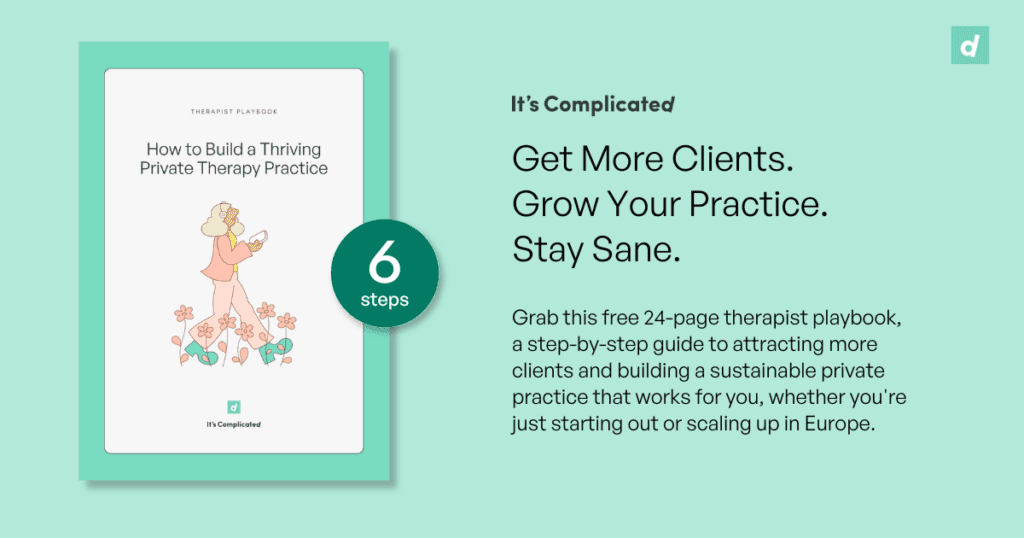Many perfectly capable therapists struggle to grow their private practice. This article takes you through seven common reasons why, along with strategies grounded in our own clinical experience meant to help you build your practice up.
Rest assured these tips were put together by the seasoned therapists behind the therapy platform It’s Complicated. Proceed with openness.
Why your client list doesn’t grow as expected
For many therapists, establishing a private practice is an exciting professional step. However, the reality can be discouraging. Even after setting up a site, curating a profile on a directory, and telling your colleagues, client inquiries may still be few and far between.
This experience is not uncommon. At It’s Complicated, we’ve supported thousands of therapists across Europe and beyond since our launch. Our team, composed of practitioners with nearly a decade of private practice experience, has observed clear patterns in what helps therapists grow sustainable practices, and what tends to hinder them. What started as preliminary insights from our founders has grown into something much more comprehensive.
Below are seven of the most common reasons therapists do not receive enough client referrals. These insights are based on years of collective experience across the therapy community and are further explored in our Therapist Playbook, a practical guide to growing your practice in an ethical and effective way.

1. Your unique perspective isn’t clear enough
Many therapists are trained to listen rather than to present themselves. This can make it challenging to communicate what makes one’s work distinctive. However, prospective clients often seek a therapist whose values, approach, and style resonate with their own.
A therapist who is able to articulate their stance on key issues, their lived experience, or their therapeutic worldview often stands out. One example from our platform is Valentina, a practitioner who is open about her queer identity, her socio-political engagement, and her commitment to intersectional perspectives. Clients often cite these elements as reasons for choosing her.
Clarity does not require oversharing. It simply means being honest about who you are and how you work. Our Therapist Playbook includes a niche discovery map designed to help therapists identify and describe the qualities that make their work effective and meaningful.
2. Your practice description is too vague or too technical
A common obstacle is a profile that lacks clarity or specificity. While it is natural to want to appeal to a wide audience, broad and generic language often leaves potential clients uncertain.
Instead, profiles that describe what a session might look like, which methods are used, and what types of concerns are most commonly addressed tend to attract more aligned clients. It is also helpful to convey tone and personality through language that reflects your way of being in the therapy room.
3. Other valuable works aren’t visible enough
Many therapists feel uncomfortable with self-promotion. However, visibility does not require aggressive marketing. Rather, it involves ensuring that people who are looking for your services can find you, and that what they find is an accurate and welcoming representation of your practice.
Simple actions such as linking to your profile in your email signature, sharing your availability on a professional network, or adding a description to your website can all contribute to improved visibility. Some of our most frequently requested therapists have used the tools in their It’s Complicated dashboard, such as social widgets, to unobtrusively share their profile in appropriate contexts.
4. No active professional network to bounce off
Referrals are often the result of mutual professional respect and trust, which develop over time within peer networks. If no such network exists, a therapist may find themselves working in isolation, without access to the kind of word-of-mouth that brings new clients.
Participating in supervision groups, joining therapist communities, or attending relevant trainings can help establish these connections. Therapists who engage in consistent professional dialogue are more likely to be remembered when referrals arise.
5. You have a tendency to say yes to everyone
Therapists are, by nature, empathic professionals. It is understandable to want to help anyone who reaches out. However, taking on every client, regardless of fit, can lead to burnout and poor outcomes for both parties.
Kevin, a therapist on our platform, advises new practitioners to develop an abundance mindset. His view is that saying no to mismatched clients protects the integrity of the therapeutic process. Knowing what types of clients you work best with and holding boundaries around your scope and availability are signs of a mature practice.
The Playbook includes worksheets that help therapists define their client criteria and create intake systems that support better alignment.
6. You aren’t using the right tools or platforms
Not all directories and platforms serve therapists equally. Some generate many leads but few conversions, while others offer meaningful visibility within a smaller, more targeted audience.
At It’s Complicated, we use a smart matching survey, developed in-house, alongside the support of trained psychologists and matching specialists. These tools help ensure clients are guided toward therapists who truly meet their needs. Therapists who use their profile and dashboard tools strategically tend to see faster growth, sometimes building part-time practices within two to six months.
7. You’re trying to grow alone
Perhaps the most invisible barrier to growth is the lack of community. Building a private practice can be lonely work, especially in the early stages. Without a sense of peer connection or guidance, the process can feel overwhelming.
Therapists who find ways to share the journey, whether through supervision, peer groups, or community platforms, often experience a renewed sense of energy and direction. In our own peer groups, we regularly see how a shared case discussion or informal conversation leads to new ideas, referrals, and collaborations.
The Therapist Playbook includes advice on joining relevant therapist communities and outlines low-pressure ways to build a supportive professional circle.
Busy practices begin with play
These patterns are not failures. They are signs that a practice may need clearer structure, a playful self-awareness, and more consistent support.
If you recognise yourself in any of these scenarios, we invite you to download our Therapist Playbook. It includes:
- A Niche Discovery Map
- Profile-writing templates
- Visibility checklists
- Referral network strategies
- Self-care and boundary planning tools
- Real stories from successful therapists across Europe
Building a practice takes time, but it is possible to do it in a way that feels sustainable and ethical. Our goal is to help therapists grow in alignment with their values and professional goals.
Download the Therapist Playbook to help you build a practice that reflects who you are, while meeting the needs of the people you trained to help.
